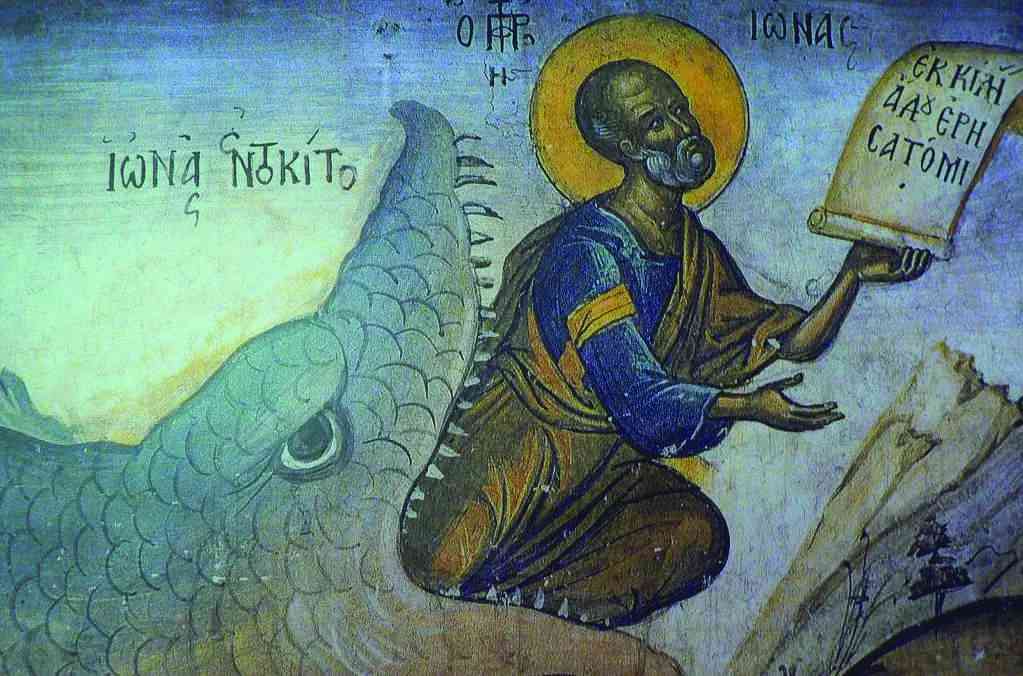When God does anything, He does it on a grand scale! God always thinks big! When He made the earth, He also made the entire universe, the stars, the sun, the moon: that entire expanse! And why? Simply because He could!
When He made Adam, and then Eve, God was not content with just another type of animal, but created humanity in His likeness and image, called us His friends, and then entrusted us with this entire world!
Even when Adam sinned, despite the punishment of exile from paradise and physical death, God did not simply walk away but presented the hope for all generations throughout all ages, the victory that God would bring in Jesus Christ!
When God called Abraham, He didn’t just say: come, just you, and follow me: He said: “I will make you into a mighty nation, and through you all the peoples of the earth would be blessed” (Gen 12). Israel was set apart, not so they could be God’s only people, but that they would be a blessing to all people!
The prophet Ezekiel declared : “God takes “no pleasure in the death of the wicked, but desires rather that they turn from their ways and live” (Ezekiel 33:11).
So then, when Jesus was born, the angel proclaimed, “Do not be afraid. I bring you good news of great joy that will be for all the people”(Luke 2:10). And the heavenly choir sang gloriously of good will to men and peace upon the whole earth!
For God’s salvation was never meant for just one race or one single people.
When God thinks big He thinks big most of all in salvation! His offer of grace extends to the ends of the earth, and His love is never limited by distance, by colour, or by race! Nor does God only save those who are loveable, adorable or cuddly:
As Jesus declared: “I have other sheep that are not of this sheep pen. I must bring them also”(John 10:16).
And we? I am sure that the words of the Great Commission as commanded by Jesus would find wholehearted agreement
amongst us all – but what about in our hearts? And then our actions?
When God sent Jonah to the wicked Assyrians, to their great city of Nineveh, it appears Jonah thought this would be a waste of good preaching.
Why would God offer the possibility of redemption to the very same people who just a few decades later would be responsible for the destruction of Israel? Why would you waste the gospel on “… the bloody city, all full of lies and plunder – no end to the prey!” Why would you waste this effort on a people who had taken others “into captivity; her infants were dashed in pieces at the head of every street; for her honoured men lots were cast, and all her great men were bound in chains.”“… upon whom has not come your unceasing evil?” (Nahum 3:1, 10, 19) It is easy to think like that – to weigh those to whom we might share the gospel – to weigh them by some standard that we think is perfectly appropriate – but is it right?
Jonah’s issue was not whether they were beyond saving, in his considered opinion, they were not worth saving. He knew the God he served, as he states “I knew that you are a gracious God and merciful, slow to anger and abounding in steadfast love, and relenting from disaster.” (Jonah 4:2)
So let me ask. Could God’s grace include someone like Vladimir Putin? Is he worth saving? Would bringing the gospel to him be a waste of good preaching? What thoughts go through our minds as we consider this question – and what are the standards by which we come to a conclusion on this matter?
Take a moment and bring to mind the faces of the persons, descriptions of the types, images of the groups, of whom we tend to be more judgemental and critical.
Is it those who do drugs – and destroy many lives through this despicable trade? Is it those who push gender ideology, creating confusion in the minds of our young and vulnerable? Is it those who peddle open and free sexuality for all and sundry? Those who advocate for abortion and euthanasia, or simply those who hold out their hands again and again for all the blessings of life – with an ever growing thirst for more?
The drunks, the down and outs, the ex-prisoners, the prostitutes, those with a police record; single parents, the ones who are just a bit too hard to love: and maybe we even think that they deserve all they get? What about educated versus uneducated, earrings in their ears or their noses … ?
What sort of personality rubs us up the wrong way – and therefore we avoid at all costs? Do we feel justified when their sin is obvious, their anti-God stance blatant, their enmity to faith consistently brutal?
Where would we draw the line?
Now some suggest that Jonah was simply being wise – why put our life in such danger – after all, if the Assyrians killed him that would be the end of any message he could bring! And perhaps that is where we draw our lines – questions of personal safety and the potential continuance of serving the Lord – but remember the apostle Paul’s words when faced with death –“For to me to live is Christ, and to die is gain. If I am to live in the flesh, that means fruitful labour for me. Yet which I shall choose I cannot tell. I am hard pressed between the two. My desire is to depart and be with Christ, for that is far better.” (Philippians 1:22-23)
Surely we should leave life and death in God’s hands, and in the meantime obey?
Some suggest Jonah was on a ‘hiding to nothing’ – his mission “Arise, go to Nineveh, that great city, and call out against it, for their evil has come up before me.” (Jonah 1:2) It was a call to condemn, a message against gross sin and depravity – not a comfortable message by anyone’s standards – and who knows how they might respond? In fact, we could almost convince ourselves that they won’t listen, they are too set in their ways, too deep in sin to even hear the call.
But again – surely the matter of a specific response is before the Lord and not ours to determine? After all: He came to us, undeserving sinners, and offered each one of us complete forgiveness, freedom from sin, salvation and life eternal in Jesus Christ, even though we only deserved hell and death!
He continues to love us all despite our failings, our weak struggles of faith, our deliberate and open sins, our hidden and private sins. He sees us only in Jesus Christ, who gave His life for us on the cross!
God still calls us each to heaven, not because we are perfect, not because we deserve it, but because that is His promise to all who believe!
God offers eternal life to those who are spiritually dead. He offers, through His prophet Jonah, to His people and even to Nineveh, the fullness of life in Jesus Christ.
Some even suggest that Jonah is concerned for the honour of His God – after all, to preach a message of judgement and then have the Ninevites repent so that the judgement is not carried out – surely that would reflect badly on God and his certain word? To that we simply suggest: let God worry about His honour – the command was clear, and was to be obeyed without equivocation.
Jonah baulked at his task because of the abounding love of God. Jonah’s theology had no place for the salvation of the Gentiles, and particularly those evil Ninevites.
Does ours?
Instead of looking through our own carefully tinted glasses as we consider those around us, we look to Jesus, the perfect Word of God, who came to save sinners!
We need to fully appreciate both the awesome privilege and rich blessing that comes with being called children of God, excited at the prospect of sharing the good news of Jesus Christ with all whom God has placed before us, and those we are yet to meet.
Our Lord took the time to speak to Gentiles! A woman at the well! To touch and heal the lepers, to sit and dine with tax collectors, to take time for a Roman centurion, those who were banished because of demon possession, and so on.
He said; “I came not to call the righteous, but sinners.”(Matt 9:13)“Love your neighbour as yourself.”(Matt 22:39) And he was so scathing of any who would consider another human being as less than themselves.
Hungry, thirsty, a stranger, naked, in prison – the issue is not where they are, or who they are, or what they are – the issue is what they need. And most of all, people need the good news of salvation.
Jesus even went so far as to proclaim: “Truly, I say to you, as you did it to one of the least of these my brothers, you did it to me.’” (Matthew 25:40)
Do we have room in our thinking and theology for those who don’t fit into our mould? Can we find a place for thoughts of love and compassion to those who we think are the bottom of the barrel? Do we classify people as good and not so good: those who are worth preaching to and those who are not? Those worth saving: and those not?
In some ways, Jonah ran away for fear of the success that God might actually save some horrible people!
Are we afraid that bringing the gospel may bring in some undesirables: that it may upset our finely balanced applecart? That it may cause some people to come in here with whom we would just rather not be seen with, or are just too difficult to include and enfold into our families?
We can run from God in our own way, but God’s plan is still there. We can run from God, and say we are all busy, we haven’t got time for Kingdom work! We too can run from God and wonder: is it all worthwhile? Will they respond, will they listen or not, will we get kicked around, should we keep trying and in the meantime sit around and do nothing?
We can wait for just the right moment to speak to our neighbours: but if we wait for that it may never come. Can we afford to wait that long?
The King, our sovereign Lord, has spoken! He gave a direct command!
Yes, Isaiah had a glorious view of the King to drive him on; Jeremiah a confidential conference with his Father; Jonah a simple, abrupt command: go!
But what’s the difference, really? God has spoken! We do not always understand all the facets of God’s command, yet we must obey! Jesus said: go to the nations, proclaim my salvation! We have no idea if our mission will stand or fall: if we will succeed or not, if people will listen or not, we are simply commanded to go.
God said to Jonah: Go to Nineveh because it won’t come to you! Jonah: take the time to go there because otherwise all those people will die! Such is the urgency of our calling!
As Paul says in Romans: “How will they hear, unless we preach to them? Blessed are the feet of those who bring good news!”(Rom 10:14-15)
Is preaching the gospel ever a waste? I think not.
Mr Reinier Noppers is a minister in the Bishopdale Reformed Church.
catalogueofstelisabethconvent.blogspot.com

